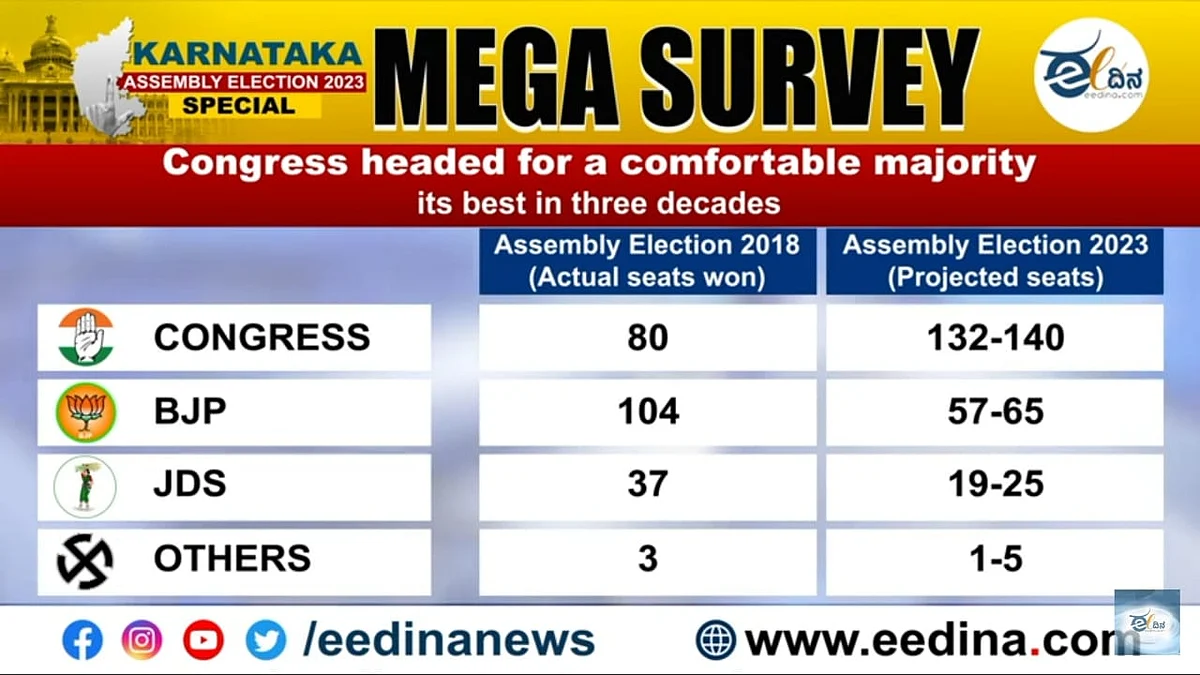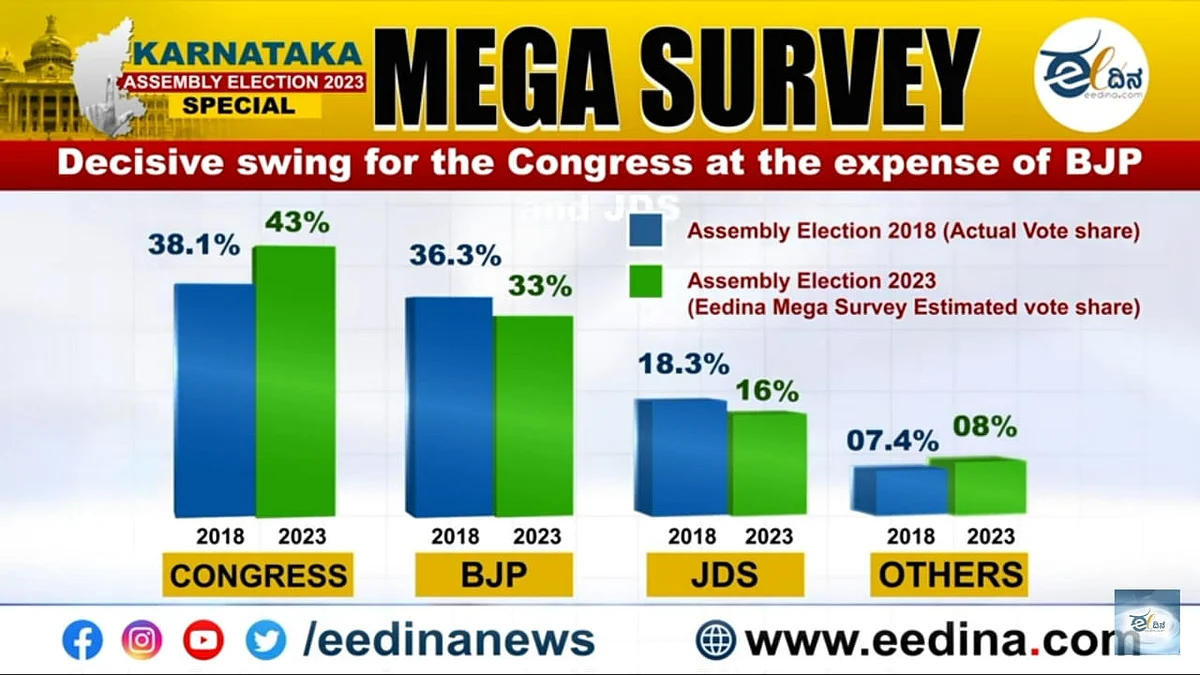Karnataka Elections: Pre-poll survey predicts Congress majority
The survey, conducted by 1,000 citizen journalists trained by a local news portal, canvassed over 41,000 voters, randomly chosen from booths selected by a computer programme.

The survey conducted by Kannada news portal eedina.com predicts a clear and convincing majority to the Indian National Congress with between 132 to 140 seats. Whether the findings of the survey are finally borne out or not, it was a notable effort for a number of reasons.
Rather than depend on paid pollsters, the portal chose to invite citizens to volunteer and then trained them to ask the right questions. In another departure from the usual, the volunteers spoke to the voters at home and not over the phone as many pollsters do. The portal also worked in close collaboration with experts and academics in framing the questions, and has also offered to share the data with universities and researchers.
Also unusually, eedina.com shared the caste break-up of the respondents, who were randomly selected by a computer programme.
From a sample size of 41,169 respondents, 17 per cent were from the Lingayat community, 10.9 per cent were Vokkaligas, 4.6 per cent belong to the economically weaker sections (EWS) that includes Brahmins, and the Kurubas and Muslims made up 8.5 per cent and 10 per cent respectively.


The survey used the caste and class data of voters to find some interesting insights. It found, for example, that the richer among the Dalit and the Muslim communities tend to vote for the Bharatiya Janata Party (BJP), while the poorer prefer the Congress.
Some other interesting findings include:
Only 12 out of the 41,169 respondents could name a state government scheme, though many remembered schemes launched by the central government.
None of the communities as a whole showed overwhelming support for any party barring the Muslims, 73 per cent of whom were inclined to vote for the Congress, with the remaining percentage inclined to vote for the Janata Dal (Secular) or even the BJP.
While Lingayats were expected to back the BJP for the most part, around 28 per cent of them plan to vote for the Congress this time.
Two-third of the respondents, 67 per cent, felt the Basavaraj Bommai government did not deserve a second chance, reflecting the strong anti-incumbency current in the state.
The pre-poll survey, conducted before the blitzkrieg of the prime minister's arrival in the state, significantly shows a greater degree of anger against the BJP leadership in the state than against the BJP legislators themselves.
While 42 per cent favoured sitting BJP MLAs being given another chance, the overwhelming opinion was that the Bommai government has been the most corrupt and inept among the last three governments.
Also Read: Election Watch: Change is in the air
In the 224-member house, the survey gives the Congress 132–140 seats, the BJP between 57 and 65 seats and the JD(S) 19–25 seats. Most other surveys have forecast 116 to 125 seats for the Congress.
While the Congress appears set to sweep northern Karnataka, BJP appear to be holding on to coastal and central Karnataka, per the eedina survey. In South Karnataka, the BJP is set to increase its vote share, mostly at the expense of the JD(S)—but does not look likely to win too many seats.
Coordinator of the eedina.com survey, Vasu H.V. confirmed to media outlets that corruption and incompetence were the twin reasons cited by respondents for their disappointment with the BJP.
Former psephologist and researcher-turned-activist Yogendra Yadav, writing in The Print, says that what impressed him about eedina's survey was its public character: 'Their sampling was fairly rigorous (random selection of booths and random selection of respondents from the voters' list of the sampled booth). The sample profile is a fair representation of the demographic profile of Karnataka… So, the researcher in me had good reasons to take their findings seriously.'
In a panel discussion hosted by eedina with Yadav and A. Narayan, professor at the School of Policy and Governance, Azim Premji University, Vasu also pointed to high prices and unemployment as the two other important causes of dissatisfaction. While the mainstream media has been quieter on these twin issues, people seem to be feeling the pinch and blame government policies for it.
Equally, the survey itself has largely gone unacknowledged by the mainstream media and politicians. Of those who did take notice, union minister Rajeev Chandrasekhar slammed the projections and alleged they were 'cooked up'. "It's really astonishing that he [Yogendra Yadav] finds time amidst his padayatras [processions on foot] and agitations to cook up surveys to please his masters," tweeted Chandrasekhar.
To this, Pawan Khera—chairman of the media department of the All India Congress Committee (AICC)—responded by tweeting, "Explains the desperation in the ranks of the BJP."
Follow us on: Facebook, Twitter, Google News, Instagram
Join our official telegram channel (@nationalherald) and stay updated with the latest headlines
